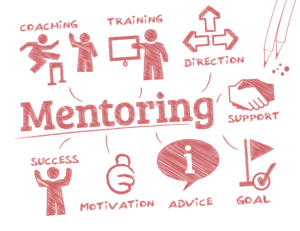Climbing the professional ladder means that some people will help you jump a few rungs to get where you want to go. You were able to get where you are from the training, support, and guidance of mentors, coaches, sponsors, and more. Now it’s time to pass on what you learned to someone else.
Benefits of Mentoring Others
Mentoring has numerous benefits. A mentor can relate to the challenges and issues that mentees face. It shapes your leadership and teaches you new skills. You become someone who can show others their strengths and weaknesses, a factor that empowers them to break out of their comfort zone. Through mentorship, individuals will not only align their perception and reality but also build invaluable networking connections.
How to be a Fearless Mentor
Wanting to be the best for your mentee is commendable. Yet, when you put too much pressure on yourself you can being to feel inadequate. Your mindset plays a huge impact in your leadership, and with the right mindset, you can overcome your fears and make the most of your abilities and gifts. Whether it is a personal or professional situation, fearless leaders around the world consistently create the optimal state of mind to face challenges and achieve success. Here are a few steps that you can take to achieve the right mindset to be fearless.
- Identify those thoughts of doubt or imposter syndrome
- Take a moment to reflect. What triggered those thoughts?
- Shower yourself with gratitude. Your not trying to be perfect, just the right mentor for the mentee.
- Adjust what you can control and move forward fearlessly!
How to Build a Relationship with Your Mentee
One of the benefits of mentorship is that it helps people build useful relationships and make connections. The modern world is more connected than ever before, with relationships and networks playing a critical role in an individual’s success. However, making connections takes time and effort.
Besides communication, mentoring means you will need to become personally invested in your mentee. Connecting with people on a personal level includes focusing on what matters to them, finding common interests, and being vulnerable.
Another way to build a relationship with your mentee is through friendship. Unlike management or another form of corporate leadership, mentors have a unique opportunity to develop lasting relationships. By approaching the mentorship through the lens of friendship, you begin to dissolve a layer of formality that allows trust and community to build.
How to Mentor and Empower Others
Everyone is keen on growing and achieving more. As a mentor, guiding others along their path can be a lot harder in practice. While everyone has their own style, there are a few universal things that all mentors do for their mentees.
1. Open your network to them
It was important for you to be around people who constantly challenge you so you could grow from multiple perspectives. Your network is just as valuable to your mentee as it was to you. Introduce them to people who can expand their opportunities.
2. Set aside time for self-reflection
Mentors should be a brutally honest friend. It can take some practice giving constructive criticism without hurting someone. The more you work on it, the better your mentee will learn from you.
3. Ask them a ton of questions!
Dig deeper into your mentee’s motivations to understand why they are coming to you. What have they not considered yet? Are they making these changes for the right reasons? Is their goal for the mentorship actually going to get them to the next step in their career?
4. Be a soundboard not a GPS
It can be easy to slip into, “this is what I did, so that is what you need to do.” Remember that everyone is on their own path and has different circumstances than you. Allow your mentee to use you as a way to open up the realm of possibilities they can take rather than a one-way street.
5. Let the mentee drive the meetings
As the more experienced individual, you may feel it is your responsibility to take charge. However, your mentee should be the one in the driver’s seat in order to promote confidence. Mentoring comes with the responsibility to empower others, so involve them in decision-making processes.
Interested in becoming a mentor? IAW’s mentor/mentee program is looking for professional women to help our community. For more information, check out our website to understand how membership can benefit you.




